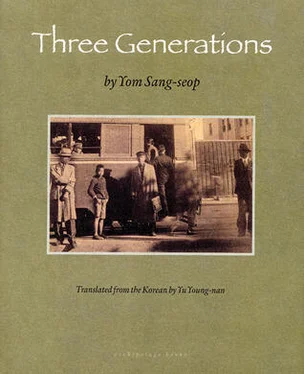“We’ll have to move somewhere far away now, and we’ll need some capital to help us get settled. You can’t expect us to go on living like this in Seoul, hiding out like criminals. And we can’t move to Suwon. Of course, we’ll raise your child for you, and by that I don’t mean that we should cut off our relationship completely. ”
Being a Christian, Sang-hun couldn’t become a free man until his wife died, and because divorce wasn’t allowed, he couldn’t live openly with Gyeong-ae. It might have been seen differently had Gyeong-ae been unknown to the congregation, but she was the daughter of a well-known church figure who had recently passed away. If she were to become Jo Sang-hun’s concubine, it would dishonor the deceased, not to mention Sang-hun. Gyeong-ae’s mother, at any rate, wanted to get out of Seoul, but at this point Sang-hun found it even more difficult to scrape together some money than when he had brought Gyeong-ae back from Tokyo. This was because the Suwon woman, having heard all the rumors from her hometown circles, had shared what she knew with the old man.
The old man never said anything directly to his son, but he tightened his purse strings even further, so the son didn’t have a penny of his own. While Sang-hun was having little success raising the money he needed, rumors continued to spread, and to make matters worse, the Suwon woman maliciously mentioned the affair to Deok-gi’s mother, who didn’t take the news sitting down.
Deok-gi’s mother went straight to the house at Bungmi Changjeong before having it out with her husband. She poured out all kinds of abuse at the women, stopping short of physically assaulting them. If they had anything more to do with her husband, she’d threatened to spread word of their affair throughout the congregation, and with the help of her stepmother-in-law’s network of friends she’d make sure they’d never be allowed to set foot in Suwon again.
Since then, Sang-hun and his wife had continued to live together in the same house, but they hardly spoke.
Though Sang-hun tried to ignore the opinions of the judgmental gossips around him, it upset him that they had misconstrued his earlier kindness to Gyeong-ae’s father and family as simply a means of getting his hands on the young woman. From the outset, he had helped Gyeong-ae’s father because the man was a patriot and an elder, and because Sang-hun sympathized with his family’s miserable condition. It was regrettable that Sang-hun had a relationship with Gyeong-ae, and he thought it was this misconception that led people to misread him.
Sang-hun was in no position to divorce a wife who was alive and well, taking into account his status as a Christian and the feelings of his grown children. Since his relationship with Gyeong-ae couldn’t last long, he even considered taking away the baby as soon as possible and having someone else raise it, which would at least give Gyeong-ae the chance to marry properly. The best way to accomplish this would have been to give her some money and send her away to a small town in the country, where she could find a job as a teacher. Such a scenario, however, was not to be, and he found himself wasting a lot of time.
In the eyes of Gyeong-ae’s mother, nothing could have been more unjust. Her daughter had been dishonored, and she herself was forced to live a life of confinement and to be the object of constant abuse. The only thing she had gotten out of it all was a grandchild, but the baby required constant care and attention. To top it off, they now lived in a house that didn’t even belong to them. Had they not been indebted to Sang-hun for his help in the past, she might have exposed his guilt to the world, because at that point it wouldn’t have mattered to her one way or the other. It was only a certain lingering loyalty to the man who had been of such assistance to her family that kept her from doing so.
She asked for a thousand won so that her family could leave Seoul, but days, then weeks went by without any word. It was unclear whether Sang-hun was finding it difficult to raise funds or whether he simply had no intention of providing the money.
One day, he came over and made something of an announcement, as if he’d come to a major decision. “Why don’t you entrust the baby to someone else and go wherever you want with this money, at least for now? Anyway, there’s no proof that the child is mine. Even if she were, I could pretend she was never born.” He then handed over three hundred won.
He added that when Gyeong-ae’s mother moved from the Dangju-dong house, she’d had five hundred in deposit money, so they must have almost a thousand, all told. But the deposit had already been spent. Although Sang-hun had helped out from time to time, his contributions were not enough, and she had had to dip into their deposit to pay for various expenses: moving, buying furniture and kitchen utensils, and for when Gyeong-ae gave birth. During the several months they had lived in the new house, apart from a little grain, Sang-hun hadn’t given them even a penny. In any event, Gyeong-ae’s mother was offended. She was positively speechless when he said that there was no proof that the baby was his. Is he human? she wondered, though the thought had crossed her mind that perhaps he just wanted to pick a fight. An argument ensued but nothing came of it. All she got was a mere three hundred won, and from that day forward, Sang-hun stopped his visits altogether.
Sang-hun thought this move of his would not only drive Gyeong-ae and him apart but also justify him in the eyes of the world. Floating the rumor that Gyeong-ae and her mother had disappeared on account of a love affair with the child’s father, whoever he was, worked decidedly in his favor. He figured they would entrust someone with the baby and move to the countryside in search of a job or of an eligible man Gyeong-ae could marry. He truly believed that it was in everyone’s best interest, since he couldn’t take responsibility for Gyeong-ae and her child. But Gyeong-ae and her mother didn’t budge from the house for the next several years.
As for Gyeong-ae’s mother, her almost masculine nonchalance drove her to a rather radical way of thinking: Why even keep in touch with such a subhuman bastard? At the same time, though, she couldn’t bring herself to completely sever ties with the man, remembering how they had been indebted to him in the past. She came to terms with her bitterness and let the matter stand.
One month passed, two months passed, then a year. After two years had gone by, tempers had subsided. Sang-hun assumed that Gyeong-ae and the baby were all right and made no attempt to find out more about them. He tried to forget everything that had happened, and his father didn’t make an issue of the house, writing off the lost rent by pretending it remained vacant. The old man was probably unaware that his son and Gyeong-ae had parted ways, but turning a blind eye was his way of respecting his son and his honor.

Deok-gi left for Kyoto three days later. His grandfather’s back pain had worsened to the point that he was now confined to bed. Someone had to attend to his ablutions, but nothing else was wrong with the old man. He ate voraciously, and the doctor said that he’d be able to get up in a week or so. Deok-gi’s grandfather told him to leave, which was just as well, as Deok-gi couldn’t afford to miss any more school right before his graduation.
Deok-gi’s mother didn’t come on the day he left. It had been three days since she had paid a visit to her sick father-in-law, after Deok-gi had conveyed his grandfather’s order that she do so, and when she did, he scolded her so harshly it infuriated her. She felt that he was unfair, but she was also afraid of him. If he hadn’t yelled at her, she would have checked on him every day, but she sent Deok-hui instead. She had wanted to see Deok-gi off but decided against it, fearful that her father-in-law would get angry again and accuse her of coming to see her son and not him. He had lashed out at her more abusively than the Suwon woman ever had.
Читать дальше













